Prendre Conjugation in All 8 Tenses
Prendre in French is one of the most frequently used verbs. The meaning of prendre is “to take” or “to come from (in the case of a place)”.
This article gives you prendre conjugations in the most common indicative tenses of the French language, as well as some hints on how you would use them in everyday speech. This article will also help you to learn correct grammar so your speech and communication skills in French become top notch!
Why only the 8 indicative tenses? Because those are the tenses you’ll hear when practicing your French! There are 13 other tenses but they have more to do with mood and intent. On top of that they’re rarely used, so even if you’re an intermediate or advanced French learner then the indicative 8 are ALL you need!
Before you continue: Corrector provides a free tool to help you correct grammar and spelling in any language (including conjugations)! Just click here to access it!
French Tenses for Prendre Conjugation
- Présent. Something that is happening now. This can either be ongoing or instant. Eg: I take. / I’m taking.
- Imparfait (imperfect). Used to describe ongoing, continual or habitual past events. Eg: I was taking.
- Passé simple is not common and normally found in formal or literary contexts. If you’re a beginner or even intermediate French learner then you can safely ignore it for now (but it’s still included below for convenience). Eg: I took
- Passé composé. Widely used to talk about completed past actions. Eg: I took.
- Futur simple (simple future) is used when you intend to describe a general future state of being. Eg: I will take. Once again, beginners can generally ignore this conjugation as there’s a much simpler version (next in list) that will suffice for now.
- Futur proche (near future) describes an upcoming action. In English this would be “I am going to take …“. This should be your go to future tense when learning conjugations.
- Plus-que-parfait (pluperfect). This tense indicates that an action had taken place and was completed before another past action took place. Eg: I took it before eating my meal.
- Passé antérieur is not common at all (just like passé simple), and again is found in formal or literary contexts. Eg: I had taken.
- Futur antérieur (future perfect) is used to describe a future action that will be completed in the future before another action is started. For example: I will have taken it before eating breakfast.
Mastering prendre conjugation in at least 3 tenses (present, passé composé and futur proche is essential for becoming proficient in French. In fact I would concentrate on these 3 and only study the others when they come up in literature or other contexts.
The following tables also give usage examples of prendre used in its respective tense.
Prendre Présent Conjugation (Present):
Présent definition: The Présent tense is used to describe actions or states that are happening at the current moment or are generally true. It is the most frequently used tense in all languages. Note that French doesn’t have the present continuous verb tense like in English. Hence, “I take” and “I am taking” both translate to je prends.
| Pronoun | Conjugation | English Translation |
|---|---|---|
| Je | prends | I take |
| Tu | prends | You take |
| Il/Elle | prend | He/She takes |
| Nous | prenons | We take |
| Vous | prenez | You take |
| Ils/Elles | prennent | They take |
Examples:
- Je prends un café chaque matin. (I take a coffee every morning.)
- Tu prends le bus pour aller au travail. (You take the bus to go to work.)
- Elle prend toujours des notes en classe. (She always takes notes in class.)
Prendre Imparfait Conjugation (Imperfect):
Imparfait definition: The Imparfait tense is used to describe ongoing or habitual actions from the past. It is commonly used to set the background for other actions in the past. In everyday French it is used to talk about past events or actions that were ongoing. Imparfait is also used to talk about feelings, attitudes, time & date and the weather. In English you may hear this said as “used to”. Eg: I used to take
| Pronoun | Conjugation | English Translation |
|---|---|---|
| Je | prenais | I used to take |
| Tu | prenais | You used to take |
| Il/Elle | prenait | He/She used to take |
| Nous | prenions | We used to take |
| Vous | preniez | You used to take |
| Ils/Elles | prenaient | They used to take |
Examples:
- Je prenais toujours le train pour aller chez mes grands-parents. (I used to take the train to go to my grandparents’ house.)
- Tu prenais des photos pendant nos vacances. (You used to take photos during our vacations.)
- Nous prenions un goûter tous les après-midis. (We used to have a snack every afternoon.)
Prendre Passé simple Conjugation (Simple Past):
Passé Simple definition: The Passé Simple manger conjugation is primarily used in written literature, especially within narrative texts such as novels, stories, and historical accounts. In everyday spoken language, the Passé Simple is rarely used but you will see it everywhere in the aforementioned literary works. In meaning there is virtually no difference between this tense and the Passé Composé. Eg: I took.
| Pronoun | Conjugation | English Translation |
|---|---|---|
| Je | pris | I took |
| Tu | pris | You took |
| Il/Elle | prit | He/She took |
| Nous | prîmes | We took |
| Vous | prîtes | You took |
| Ils/Elles | prirent | They took |
Examples:
- Je pris un livre et je commençai à lire. (I took a book and started reading.)
- Tu pris la décision de partir. (You made the decision to leave.)
- Elle prit le dernier morceau de gâteau. (She took the last piece of cake.)
Prendre Passé composé Conjugation (Present Perfect):
Passé Composé definition: The Passé Composé tense is used to talk about completed actions in the past. It is one of the most common past tenses and is frequently used in everyday French language. The key fact you need when deciding to use this tense is to ask if the past action have a start and finish in the past. If yes, then Passé Composé is the tense you need! The literal translation is “I have taken” but in English we normally shorten this to “I took“.
| Pronoun | Conjugation | English Translation |
|---|---|---|
| J’ai | pris | I have taken |
| Tu as | pris | You have taken |
| Il/Elle a | pris | He/She has taken |
| Nous avons | pris | We have taken |
| Vous avez | pris | You have taken |
| Ils/Elles ont | pris | They have taken |
Examples:
- J’ai pris un taxi pour me rendre à l’aéroport. (I have taken a taxi to get to the airport.)
- Tu as pris des vacances bien méritées. (You have taken well-deserved vacation.)
- Nous avons pris des photos lors de notre voyage. (We have taken photos during our trip.)
Prendre Futur simple Conjugation (Simple Future):
Futur simple definition: The futur simple is used to express an action that will happen in the future. It is commonly used in everyday language when talking about general future plans or intentions. If you find this tense complicated then you can always just use the “aller” form in the next section “futur proche”.
| Pronoun | Conjugation | English Translation |
|---|---|---|
| Je | prendrai | I will take |
| Tu | prendras | You will take |
| Il/Elle | prendra | He/She will take |
| Nous | prendrons | We will take |
| Vous | prendrez | You will take |
| Ils/Elles | prendront | They will take |
Examples:
- Je prendrai le train pour aller à la conférence demain. (I will take the train to go to the conference tomorrow.)
- Tu prendras soin de mon chien pendant mon absence. (You will take care of my dog while I’m away.)
- Ils prendront des décisions importantes pour l’entreprise. (They will make important decisions for the company.)
Prendre Futur Proche Conjugation (Near Future):
Futur Proche definition: This is known as the “going to [come]” future tense. It is used to express actions that are planned or about to happen in the near future. It is very commonly used in everyday spoken French. Technically it is not an official tense but is often listed as one.
| Pronoun | Conjugation | English Translation |
|---|---|---|
| Je | vais prendre | I am going to take |
| Tu | vas prendre | You are going to take |
| Il/Elle | va prendre | He/She is going to take |
| Nous | allons prendre | We are going to take |
| Vous | allez prendre | You are going to take |
| Ils/Elles | vont prendre | They are going to take |
Examples:
- Je vais prendre un café après le déjeuner. (I am going to take a coffee after lunch.)
- Nous allons prendre le train de 18 heures. (We are going to take the 6 o’clock train.)
- Ils vont prendre des cours de danse ce week-end. (They are going to take dance classes this weekend.)
Prendre Plus-que-parfait Conjugation (Pluperfect):
Plus-que-parfait definition: Expresses an action that had happened before some other past action took place. It is commonly used in written language, especially in literature and formal texts.
| Pronoun | Conjugation | English Translation |
|---|---|---|
| J’avais | pris | I had taken |
| Tu avais | pris | You had taken |
| Il/Elle avait | pris | He/She had taken |
| Nous avions | pris | We had taken |
| Vous aviez | pris | You had taken |
| Ils/Elles avaient | pris | They had taken |
Examples:
- J’avais pris un parapluie, mais il n’a pas plu. (I had taken an umbrella, but it didn’t rain.)
- Tu avais pris ta décision avant même de me consulter. (You had made your decision even before consulting me.)
- Nous avions pris un chemin différent pour éviter le trafic. (We had taken a different route to avoid traffic.)
Prendre Passé Antérieur Conjugation (Past Anterior):
Passé Antérieur definition: This tense is a literary tense used in formal and historical writing. It is similar in meaning to the Plus-que-parfait tense (Pluperfect) but is considered more archaic and is mostly found in classical literature. As a French speaker you will hardly ever (if at all) use this tense!
| Pronoun | Conjugation | English Translation |
|---|---|---|
| J’eus | pris | I had taken |
| Tu eus | pris | You had taken |
| Il/Elle eut | pris | He/She had taken |
| Nous eûmes | pris | We had taken |
| Vous eûtes | pris | You had taken |
| Ils/Elles eurent | pris | They had taken |
Examples:
- J’eus pris un coup de soleil après une journée à la plage. (I had gotten a sunburn after a day at the beach.)
- Nous eûmes pris tous les préparatifs nécessaires. (We had taken all the necessary preparations.)
- Ils eurent pris la décision de déménager. (They had made the decision to move.)
Prendre Futur Antérieur Conjugation (Future Perfect):
Futur Antérieur definition: This tense is used to express actions that will have been completed before a specific future point in time. In fact that preceding sentence is an exact example of it, using the phrase “will have been”. It is used both in written and spoken language.
| Pronoun | Conjugation | English Translation |
|---|---|---|
| J’aurai | pris | I will have taken |
| Tu auras | pris | You will have taken |
| Il/Elle aura | pris | He/She will have taken |
| Nous aurons | pris | We will have taken |
| Vous aurez | pris | You will have taken |
| Ils/Elles auront | pris | They will have taken |
Examples:
- J’aurai pris toutes les mesures nécessaires avant le départ. (I will have taken all the necessary measures before leaving.)
- Tu auras pris tes décisions avant la réunion. (You will have made your decisions before the meeting.)
- Ils auront pris leur retraite d’ici cinq ans. (They will have retired within five years.)
Wrap Up
Prendre conjugation isn’t too difficult to learn as long as you stick to present, futur proche and imparfait tenses. You can safely ignore the others for now (but do come back when you’re happily proficient in French).
If you’d like to read more about French verbs, conjugation and tenses then check out this article on how to master French verb conjugations. Lot’s of great tips in there if you’re struggling!
Alternatively let us do the hard work of analysing your French texts by using our free tool! It even picks up prendre conjugation mistakes!
Prendre Conjugation Table Images (FREE to Download)
To download a zip file of all the Prendre Conjugations simply click this link. Alternatively click the images below and save individual conjugation tables.
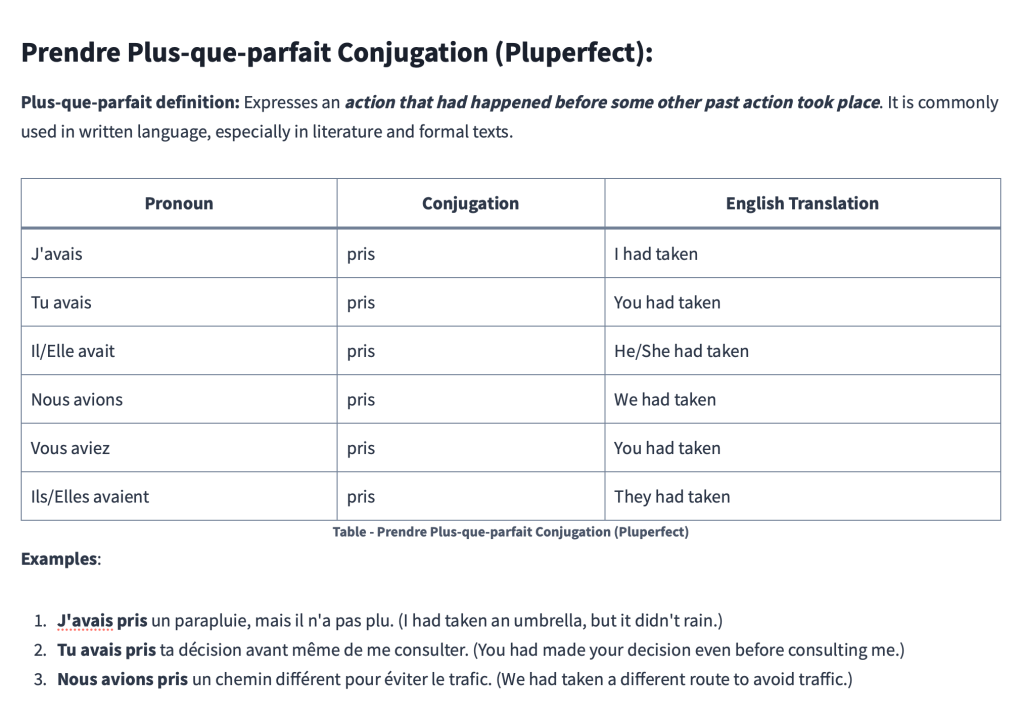
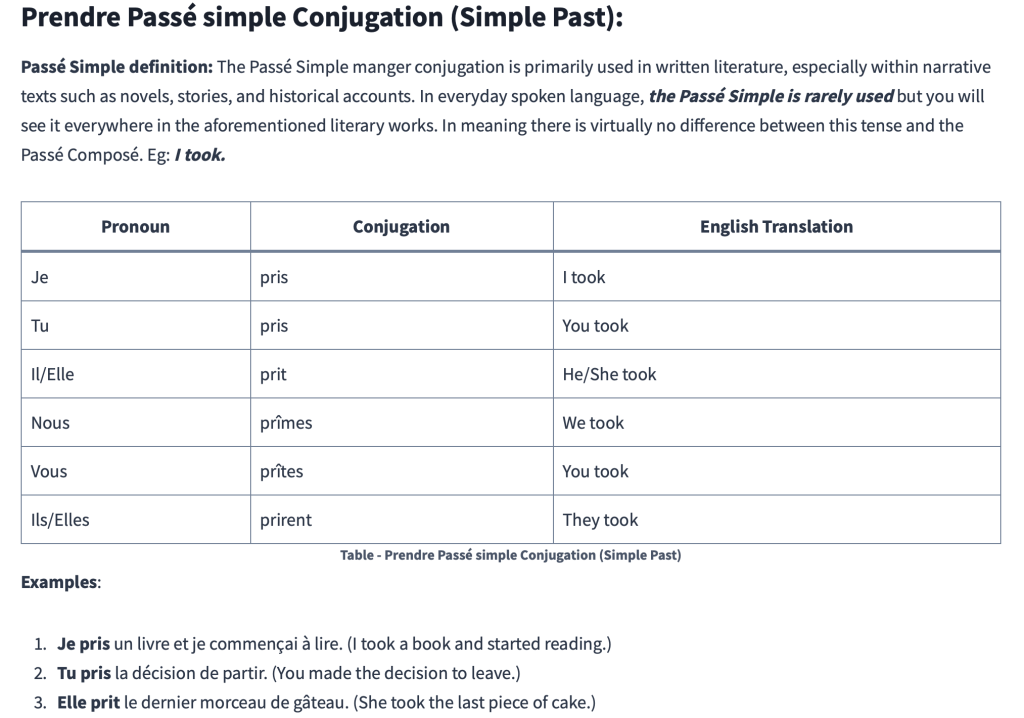
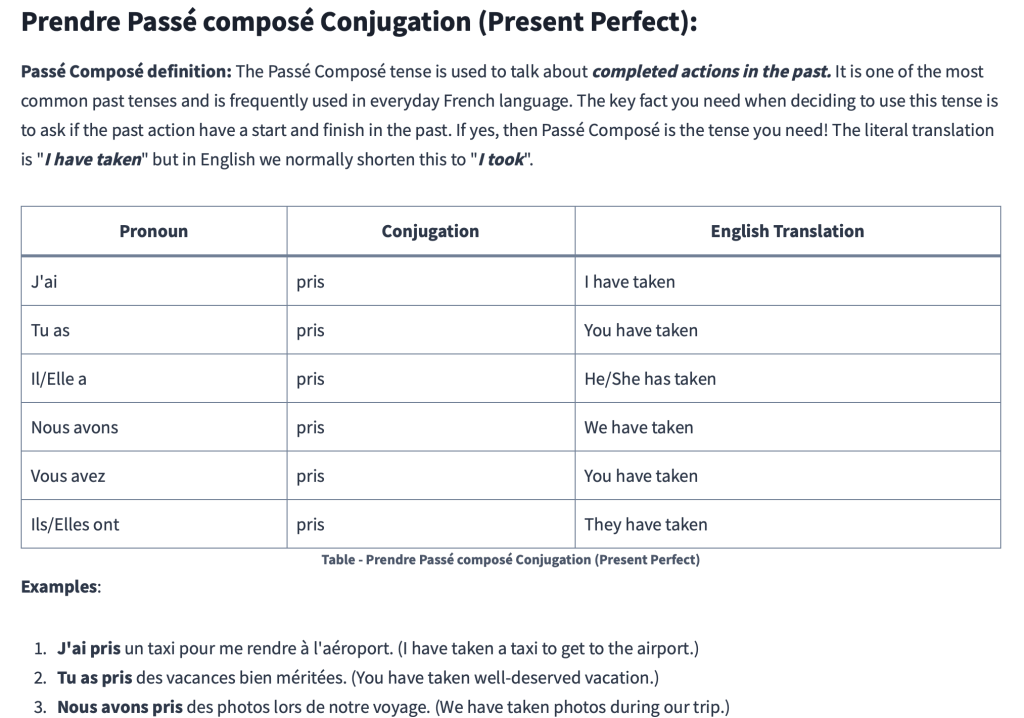
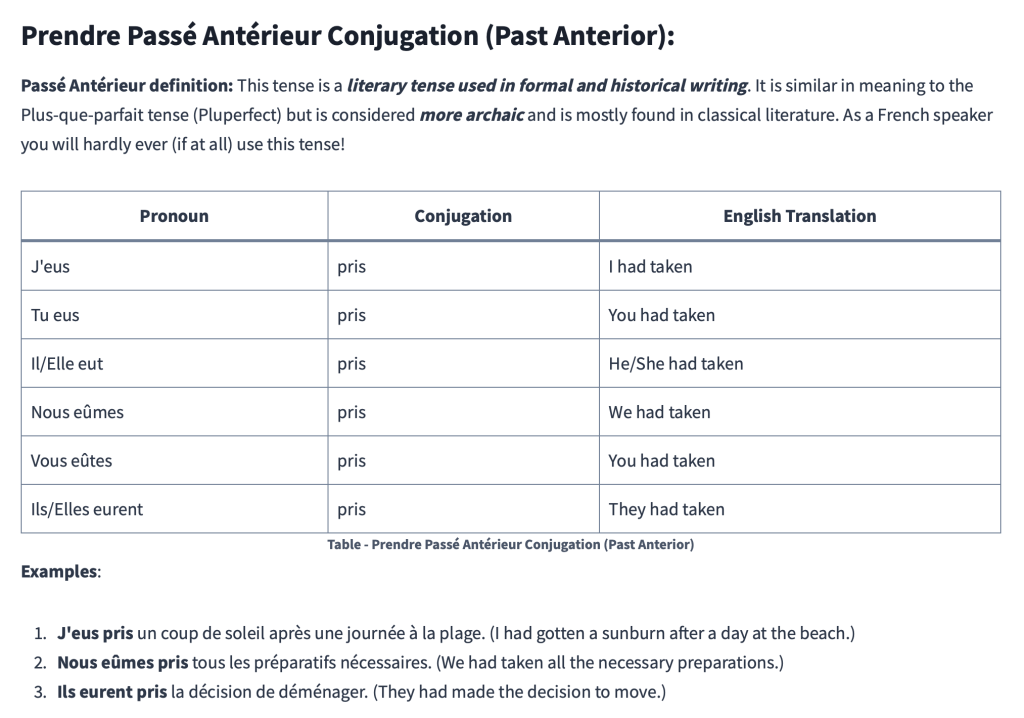
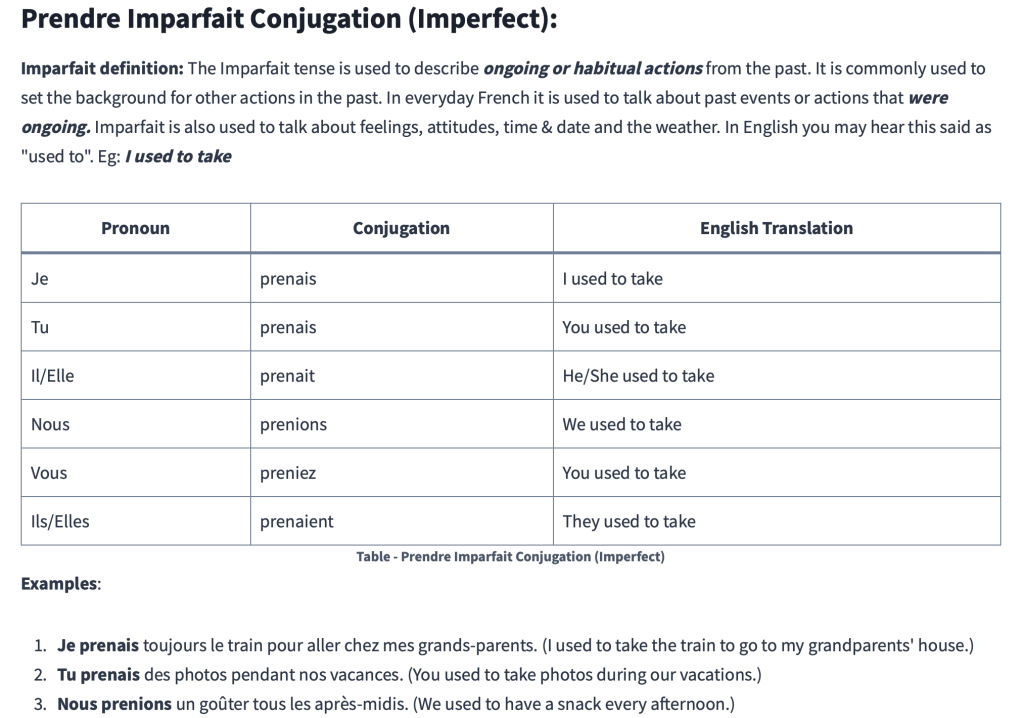
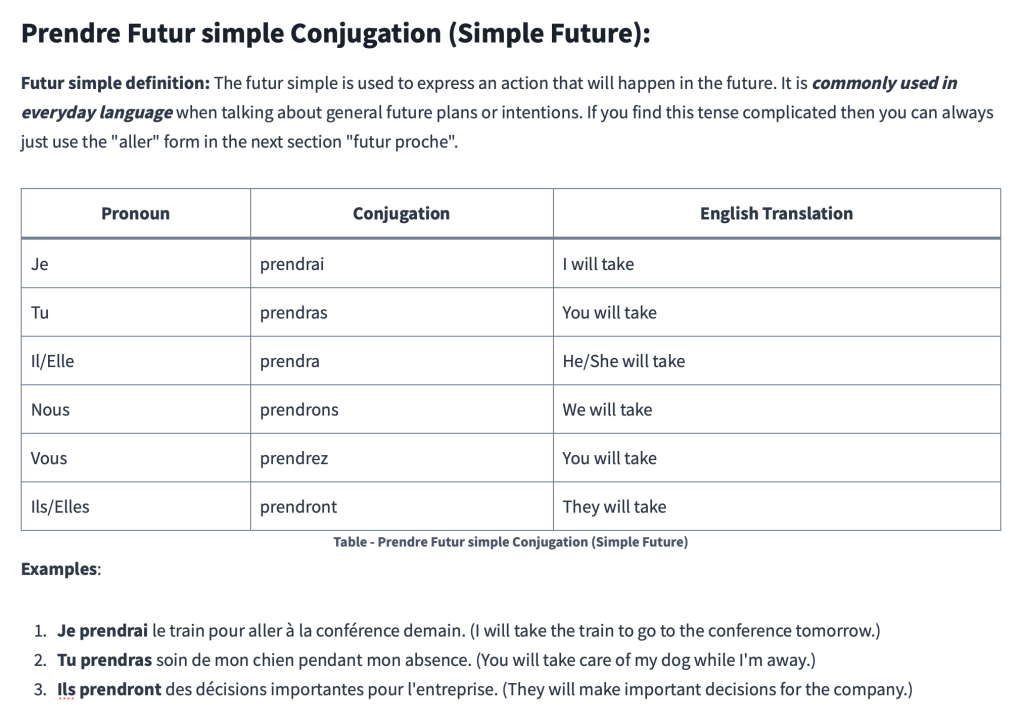
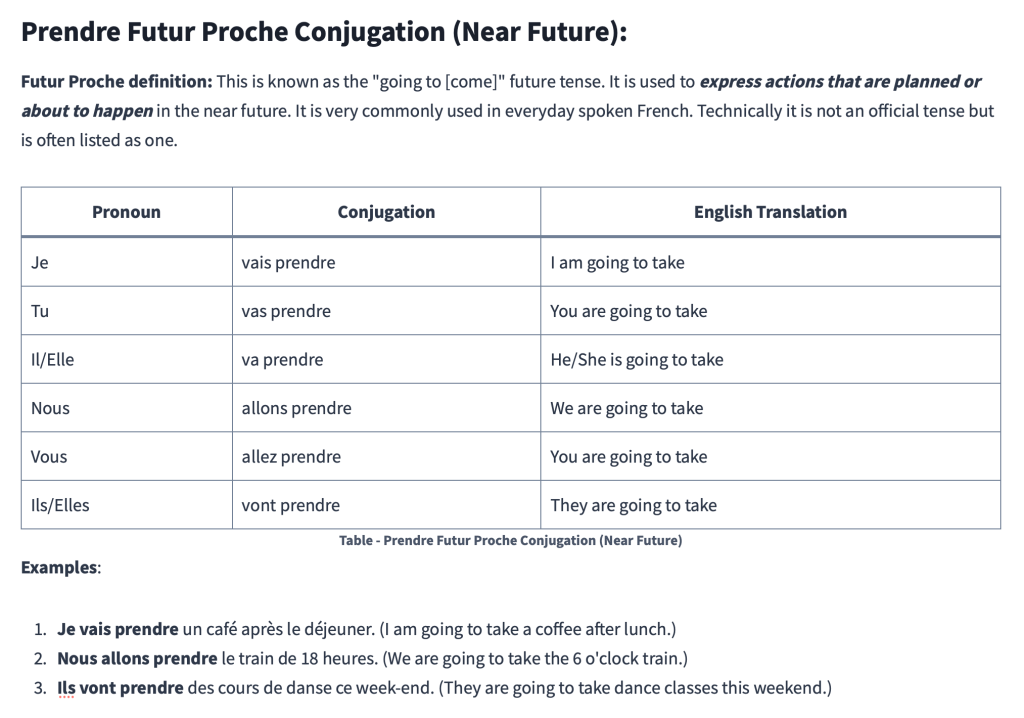
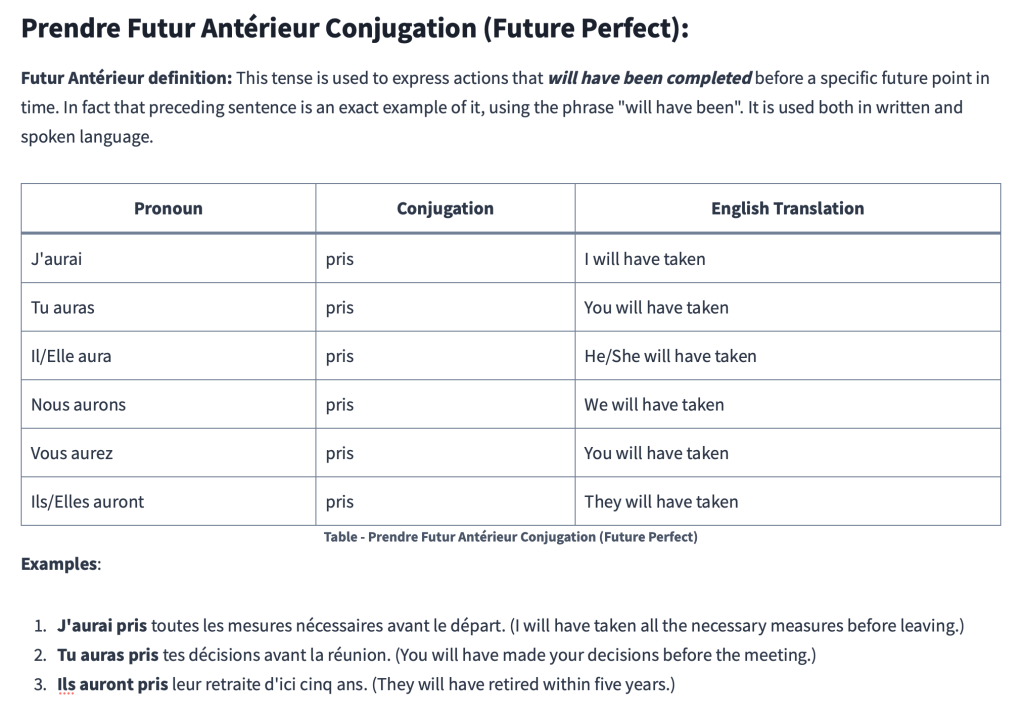
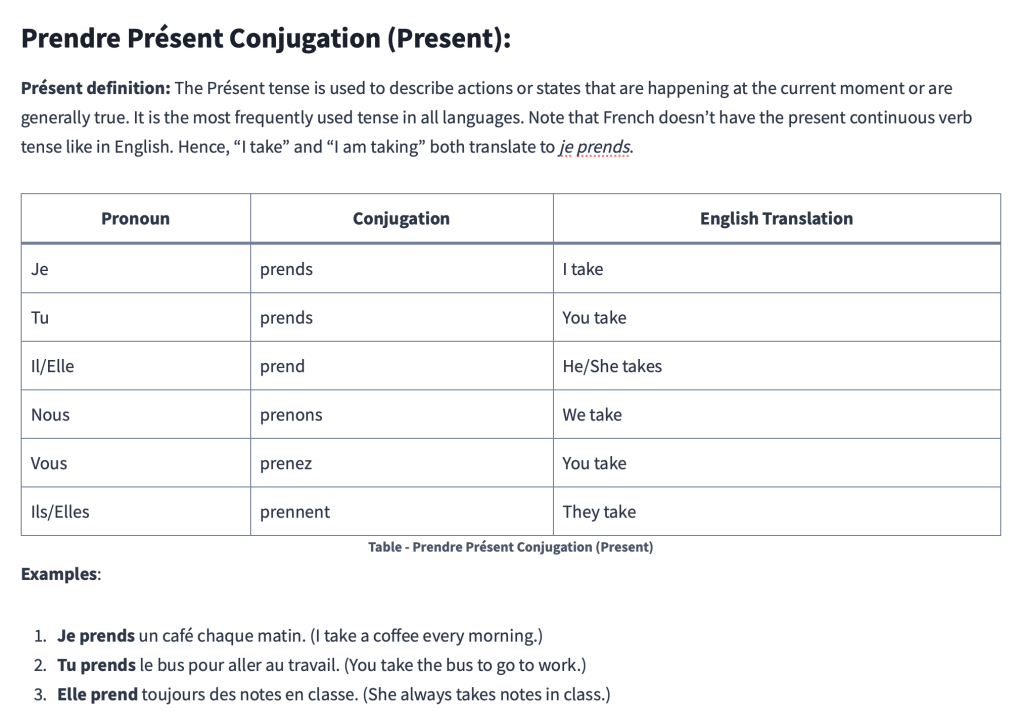
Other French Verb Conjugations You May be Interested In
We don’t only have prendre conjugations! Here are some others you may want to check out! Also, check out this link which tells you the history of the word.
